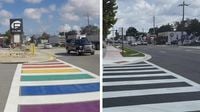In the predawn hours of August 21, 2025, a rainbow-colored crosswalk that had become a symbol of resilience and remembrance outside Orlando’s Pulse nightclub was painted over by state workers. The removal, which took place nearly a decade after the crosswalk was first installed, has ignited a fierce debate across Florida and the nation about the intersection of public art, politics, and the enduring legacy of one of the deadliest mass shootings in U.S. history.
The crosswalk, painted in 2017, stood as a tribute to the 49 lives lost and 53 wounded during the horrific attack at Pulse, an LGBTQ-friendly nightclub, on June 12, 2016. According to CNN and the Associated Press, the massacre, which occurred during a Latin night celebration, was the worst mass shooting in modern U.S. history at the time. The shooter, Omar Mateen, pledged allegiance to the Islamic State group and was killed after a tense three-hour standoff with police.
For many in Orlando, the rainbow crosswalk was more than just a piece of street art. Orlando Mayor Buddy Dyer said in a statement, “This crosswalk not only enhanced safety and visibility for the large number of pedestrians visiting the memorial, it also served as a visual reminder of Orlando's commitment to honor the 49 lives taken.” He called the removal “callous” and “a cruel political act,” emphasizing that the action was taken “without any supporting safety data or discussion.”
The decision to erase the crosswalk was not made in isolation. In June 2025, Will Watts, assistant secretary for the Florida Department of Transportation, issued a memo prohibiting “surface art” on crosswalks, sidewalks, intersections, travel lanes, or shoulders if it conveyed “social, political or ideological messages or images and does not serve the purpose of traffic control.” The memo, as reported by The Hill and AP, stated that such art could “lead to distractions or misunderstandings, jeopardizing both driver and pedestrian safety.”
Florida Governor Ron DeSantis, responding to criticism on August 21, 2025, doubled down on the policy, declaring on social media, “We will not allow our state roads to be commandeered for political purposes.” The governor’s stance follows a broader state and federal push—also championed by the Trump administration—to remove what they term “asphalt art” from public roadways, citing safety concerns and the need to keep taxpayer-funded streets free from political banners.
The Florida Department of Transportation’s review of all state-maintained roadways led to directives for cities across the state—including Delray Beach, Key West, and St. Petersburg—to remove rainbow-painted crosswalks or risk losing transportation funding. In St. Petersburg, officials have requested exemptions for several street art installations, arguing that they foster community spirit.
The removal of the Pulse crosswalk, however, struck a particularly raw nerve. The city of Orlando, which purchased the Pulse site in 2023, has plans to demolish the nightclub building and construct a permanent memorial. In the meantime, the crosswalk had become a gathering place for those wishing to honor the victims and affirm LGBTQ visibility.
State Senator Carlos Guillermo Smith, an openly gay Democrat from Orlando and the first openly gay Latino elected to the Florida Legislature, condemned the crosswalk’s removal in a passionate video posted outside the freshly painted-over intersection. “Of course they did this in the middle of the night, because they knew what they were doing is wrong,” Smith said. He later called the act a “disgusting betrayal,” adding, “They did this in the middle of the night because they were scared of the resistance because they know what they did was wrong.”
Brandon Wolf, a survivor of the Pulse shooting and spokesperson for the Human Rights Campaign, also voiced his outrage. “In the dark of night, they came to erase our show of solidarity, our declaration that we will never forget,” Wolf wrote on social media. He continued, “The cowards who feel threatened by our lives should feel lucky they didn’t have to bury the ones they love — then watch the state come & desecrate their memory.” Wolf lost two close friends, Drew Leinonen and Juan Guerrero, in the tragedy.
The LGBTQ rights group Equality Florida responded by organizing a peaceful gathering at the Pulse Memorial on the evening of August 21, 2025. The organization urged Floridians to make their presence “undeniable” by displaying rainbow stickers, clothing, and flags, and to use the hashtag #ShowYourRainbow online. In a statement, the group said, “Monuments, murals, and rainbow crosswalks are not just symbols; they are powerful celebrations of LGBTQ existence. They are our commitment to remember, and our promise that these harms will not be inflicted again.”
After news of the crosswalk’s removal spread, a handful of residents gathered at the site, waving rainbow flags and coloring the crosswalk with chalk. Their efforts, however, were washed away by an afternoon rainstorm—a poignant metaphor, perhaps, for the ongoing struggle to maintain visibility and memory in the face of official opposition.
State officials, for their part, insist the move was about standardizing traffic control and ensuring public safety, not erasing history or targeting LGBTQ communities. Michael Williams, communications director for the Florida Department of Transportation, stated, “Transportation infrastructure is for the movement of people and goods. In this case, while the crosswalk has been restored to its proper form, local efforts are underway to construct a permanent memorial on adjacent properties funded by the State of Florida. Any attempt to suggest otherwise is false.”
The controversy comes amid a broader climate of tension around LGBTQ rights and visibility in Florida and nationwide. In June, during the annual order honoring Pulse victims, Governor DeSantis omitted references to LGBTQ and Hispanic communities—groups disproportionately affected by the shooting—after having recognized both in nearly identical orders in previous years. This omission did not go unnoticed by local leaders and activists, who view such actions as part of a pattern of diminishing LGBTQ acknowledgment in public spaces.
Despite the setback, advocates promise the memory of the Pulse victims and the city’s commitment to LGBTQ visibility will endure. “There will be a rainbow mural nearby that is even bigger, queerer and more colorful than they ever imagined,” Smith vowed.
As Orlando moves forward with plans for a permanent memorial, the debate over rainbow crosswalks and public art continues to mirror larger questions about who gets to define the meaning of public spaces, and how best to honor the past while navigating present-day political realities. For now, the painted-over crosswalk stands as a stark reminder of the ongoing struggle for recognition and remembrance in the wake of trauma.


